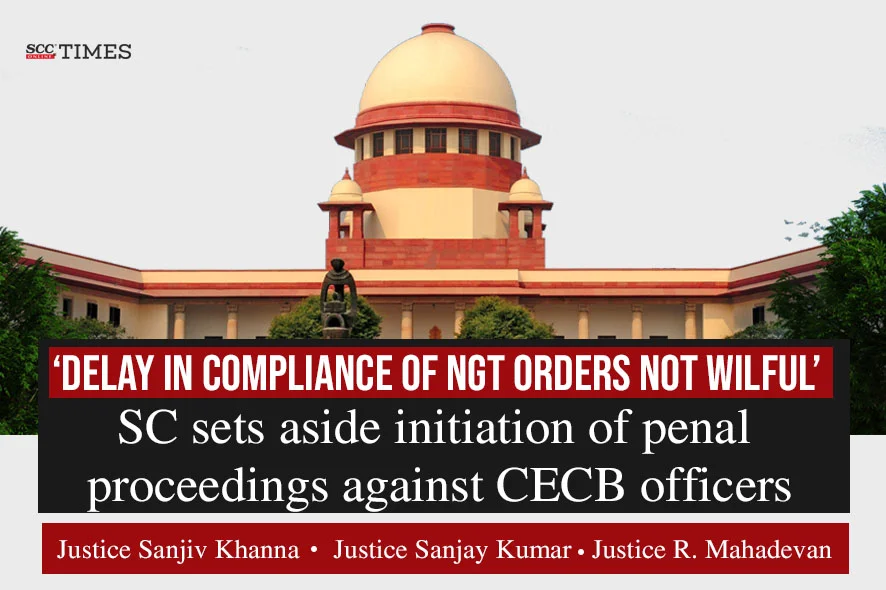Supreme Court: The instant appeal challenged the order of National Green Tribunal (NGT) dt 21-8-2023, whereby the NGT had refused to extend time for compliance of its order dated 3-2-2023 and went on to consider the provisions of Section 26 of the NGT Act, 2010, stating that the Chairman and Member Secretary of Chhattisgarh Environment Conservation Board (CECB) had committed the offence of failing to comply with its orders and directed necessary penal action being initiated against.
The 3-Judge Bench of Sanjiv Khanna, Sanjay Kumar* and R. Mahadevan, JJ., while taking serious view of the delay and lapses on the part of CECB in implementing the direction of the NGT, set aside the impugned order dt. 21-8-2023 stating that delay on the part of the CECB in following directions of NGT order dt. 3-2-2024, did not amount to wilful negligence or an abject dereliction of duty on its part in abiding by such directions. The Court further pointed out that CECB has achieved full compliance with the directions issued by the NGT vide order dt. 3-2-2023.
Background and Legal Trajectory:
The Central Pollution Control Board (CPCB) in a letter dt. 5-2-2014, issued directions under the Water (Prevention & Control of Pollution) Act, 1974, and the Air (Prevention & Control of Pollution) Act, 1981, in the context of 17 categories of highly polluting industries. The CPCB directed installation of Online Continuous Emission Monitoring Systems (OCEMS) for these categories of industries, apart from Online Effluent Quality Monitoring Systems (OEQMS) at the outlets of their Effluent Treatment Plants. The State Pollution Control Boards were required to ensure installation and regular operation of pollution control facilities, such as continuous effluent and emission monitoring devices in these industries.
Thereafter in Paryavaran Suraksha Samiti v. Union of India, (2017) 5 SCC 326, the Supreme Court issued directions installation of Effluent Treatment Plants, Common Effluent Treatment Plants and Sewage Treatment Plants. Furthermore, National Green Tribunal benches were required to supervise complaints of non-implementation of the said directions. Private individuals and organizations were granted liberty to approach the jurisdictional NGT for appropriate orders, by pointing out deficiencies in implementation of the directions. Lastly, the Court concluded that it would be in the interest of implementation of the objective sought to be achieved, to require a provision being made for continuous online monitoring systems to display the emission levels in the public domain.
Thereafter, NGT in its order dt. 3-2-2023, the NGT considered the compliance measures taken in the States of Madhya Pradesh, Rajasthan and Chhattisgarh. Insofar as the State of Chhattisgarh was concerned, the NGT noted that there were 167 industries in the 17 identified categories of highly polluting industries. However, only 84 such industries could be accessed, using the links of those industries with user-id and password, and the public could not directly access the online data. Chhattisgarh Environment Conservation Board (CECB) stated that it was trying to resolve that issue and further reported that it had directed 13 industries whose data were inaccessible due to network issues to rectify the problem and ensure uninterrupted and regular availability of monitoring data.
The NGT also noted that the website of the CECB was active, but it was not user friendly, furthermore, the CECB did not have historical data of most of the industries. The State of Chhattisgarh was accordingly directed to make the website more user friendly within 60 days.
The CECB filed an application on 21-6-2023 before NGT seeking extension of time to make real time data acquisition and its handling efficient and accessible throughout the State. The CECB also enumerated the steps that they had taken so far in compliance with the order dt. 3-2-2023.
However, NGT in its impugned order remarked that the State of Chhattisgarh had failed to comply with its order and opined that the application was thoroughly misconceived and showed a serious functional irregularity in efficiency and competence on the part of officials of the CECB in complying with its orders, despite pendency of the matter for almost two years.
Concluding that the CECB was taking an adamant attitude even though a matter related to environment and its monitoring had an element of urgency, NGT refused to extend time and initiated penal action against the CECB officers.
The Supreme Court, via its orders dated 09-10-2023 and 16-10-2023, stayed the direction of the NGT to lodge prosecution against the appellants and directed them to file affidavits.
Court’s Assessment:
Perusing the facts of the case and compliance affidavits filed by the appellants, the Court noted that direct access link to 128 out 167 industries was provided on the CECB’s website in November 2023, itself. The real time and historical data of Continuous Ambient Air Quality Monitoring Systems (CAAQMS)/Continuous Emission Monitoring Systems (CEMS)/Effluent Quality Monitoring Systems (EQMS) for the 32 industries covered under Phase-I was also made available on the website.
The Court further noted that notices were stated to have been sent to the remaining industries which had not implemented a user-friendly system and, consequently, by December 2023, direct access link to all 167 industries, covered by Phases I and II, was made available on the CECB’s website.
The Court however took serious note of the delay and lapses on part of CECB. Perusing Section 26 of NGT Act, 2010, the Court pointed out that the power to initiate penal action for non-compliance of an order, award and decision of the NGT must be exercised with care and caution.
The Court said that the delay on part of CECB was not wilful. However, the Court emphasised that every State organ and, particularly, the wings of the Government associated with environment protection, such as the CECB, must be even more diligent in ensuring timely compliance with the directions of the NGT and such directions that are aimed at protection and preservation of the ecology and environment and must take highest priority.
Observing that the CECB has achieved full compliance with the directions given by NGT on 3-2-2023, the Court deemed it fit to set aside the impugned order and let the matter rest.
CASE DETAILS
|
Citation: Appellants : Respondents : |
Advocates who appeared in this case For Petitioner(s): For Respondent(s): |
CORAM :









